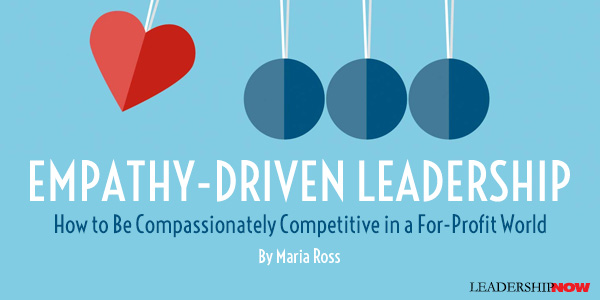 |
 |
11.22.19

Empathy-Driven Leadership: How to Be Compassionately Competitive in a For-Profit World
EMPATHY? Isn’t that for directors of nonprofits and starry-eyed Millennial entrepreneurs with idealistic dreams? What good is empathy in an uber-competitive, saturated marketplace where leaders need to capitalize on every opportunity to stand out? The Empathy Edge definitively answers these questions showing how for-profit leaders can use empathy to gain the upper hand. Contrary to popular belief, compassion and empathy are actually huge assets in the business world. What if leaders could shift the cultural mindset around what gives businesses a competitive advantage and recognize the benefits of being more human? Not only would they build smarter businesses, connect more deeply with their customers, and become stronger leaders, but also maybe, just maybe, our world could become a little bit better. This is an interesting proposition. Leaders are in a position to influence how we think about the relationship between empathy and industry. Still, a sea change like this is hard-won. So, what’s in it for the leaders themselves? Benefits of Empathetic Leadership When you start to explore the benefits of empathetic leadership on a deeper level, it becomes difficult to see empathy as anything other than essential for competent leadership. Highly empathetic people (or HEP’s) recognize the pain and suffering of others as a problem in need of a solution. This is the foundation of every good business model. Further, without empathy, leaders can’t build a team, inspire followers, or elicit loyalty. Among the benefits that come to empathetic leaders, whether they are entrepreneurs or c-suite executives, are the following:
The benefits of empathy for individual leaders are many, and this list likely only scratches the surface. But it’s clear that empathy is a core leadership skill. Now you may be wondering what it takes to be (or become) an empathetic leader. You may recognize empathy as an innate human trait, and as with all human traits, there is a spectrum of strengths and weaknesses. Some of us are naturally “gifted” when it comes to being able to relate to others’ experiences, while others are naturally lower on the empathy scale. The good news is—no matter where you find your natural tendency—empathy, like other leadership skills, is something we can learn, cultivate, develop, and teach to others. In the book, you will find seven simple ways to train yourself to lead more empathetically. Here are four of the most actionable steps you can take: 1. Practice Presence. When you feel constantly scattered and spread too thin, it may seem like you can’t find even five minutes in your busy workday to take a break. But if you can’t ground yourself, how can you expect to be able to consider others’ perspectives? When you’re present with yourself, you’ll have a fighting chance of being present with others. Create space for a daily practice of meditation or simply sitting in silence. Even a few minutes will help. 2. Listen More, Stay Humble. Empathy requires a mind that is open to listening to people’s experiences, stories, and perspectives. When you really listen, you aren’t tempted to jump in and offer advice or make demands. Instead, the tendency is to pause and look for patterns before providing relevant feedback. Empathetic leaders embody a servant’s mindset staying humble and looking for common ground with colleagues, employees, and customers. 3. Be Curious. The ability to put yourself in the shoes of those you’re leading requires being genuinely curious about where they’re coming from. Authentically empathetic people have never met another person from whom they couldn’t learn something. As a leader who may be tasked with teaching others, it’s easy to feel disconnected from the part of yourself that is constantly curious. But if you look carefully, you’ll find it’s still there. Reconnect with your curious inner child, stay open, and watch opportunities come your way. 4. Get in the Trenches. Empathetic leaders are hungry to understand their staff better. There’s no better way to understand someone else than by standing shoulder-to-shoulder with them and experiencing exactly what they experience. If you deem a job “beneath” you or a “waste of your time,” consider the message you’re sending to those doing this job. Try a colleague’s job, work the customer support phones, or go on a sales call. You’ll be surprised by what you learn about your company, your employees, and yourself.  The Empathy Edge expertly weaves together engaging stories and compelling interviews with leaders who embody empathetic leadership. Maria Ross’s talent as a storyteller is rivaled only by her ability to offer straightforward, practical steps for executives and brands that want to increase productivity, find financial success, and integrate emotional intelligence. The big takeaway: when empathy and compassion lead, incredible success—both professional and personal—follows.
Posted by Michael McKinney at 07:45 AM
|
BUILD YOUR KNOWLEDGE
 

How to Do Your Start-Up Right STRAIGHT TALK FOR START-UPS 
Grow Your Leadership Skills NEW AND UPCOMING LEADERSHIP BOOKS 
Leadership Minute BITE-SIZE CONCEPTS YOU CAN CHEW ON 
Classic Leadership Books BOOKS TO READ BEFORE YOU LEAD |